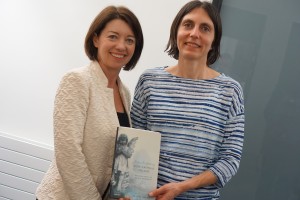 My latest book, Transforming Post-Catholic Ireland: Religious Practice in Late Modernity, has been reviewed on the new Reading Religion website, a publication of the American Academy of Religion.
My latest book, Transforming Post-Catholic Ireland: Religious Practice in Late Modernity, has been reviewed on the new Reading Religion website, a publication of the American Academy of Religion.
The review is written by Amy Heath-Carpentier, a graduate student at California Institute of Integral Studies & Assistant Director, Washington University in St. Louis.
Excerpts are reproduced below:
Much has been written on secularization and the post-secular within the European context. Ireland’s religious landscape over the past two centuries has diverged dramatically from the broader European context. In this period of transition from sectarian conflict in Ireland, few are as well positioned as Gladys Ganiel to study the social and personal impact of what Diarmuid Martin, Catholic Archbishop of Dublin, characterizes as “Post-Catholic Ireland” (1). A Research Fellow in Conflict Transformation and Social Justice at Queen’s University Belfast, Ganiel evaluates how citizens of the Republic of Ireland and Northern Ireland are coping and flourishing despite the pressures of secularization and religious diversification in what she describes as a “mixed, post-Catholic religious market” (2).
The book is well organized. Ganiel begins by delineating her theoretical orientation in chapter 1. She unweaves Jürgen Habermas’ concept of the post-secular and relates it to Martin’s concept of post-Catholic, evoking “a shift in consciousness in which the Catholic Church, as an institution, is no longer held in high esteem by most of the population and can no longer expect to exert a monopoly influence in social and political life” (4). Ganiel does not intend to imply a split between two eras: the prior one, Catholic, and the present, secular. Instead, her case studies reveal how individuals are finding spiritual outlets outside of institutional churches and yet, at the same time, how they are articulating their spiritual lives in concert or contrast to their perceptions or experiences of Catholicism. She links this to processes of religious individualization. Further, Ganiel defines her key concept of extra-institutional religion as “various methods and strategies people use to keep their faith alive, outside or in addition to the institutional Catholic Church” (5).
… The seven individual case study chapters sometimes challenge Ganiel’s concept of extra-institutional religion as many of the case studies are affiliated with the Catholic Church or might be considered churches themselves. The key to understanding how Ganiel applies this term is her emphasis on “extra” as outside of the services, dogma, and doctrine offered or prescribed by institutional churches, particularly Catholic, and the process of religious individualization that she establishes earlier. Her interviewees often contrasted their spirituality against their life within or perceptions of Catholic religious life. I wondered whether the focus on Catholicism undermined any minority voices who articulated the same phenomenon in reference to the Church of Ireland or Presbyterianism, the two dominant Protestant churches in Ireland.
Finally, Ganiel’s book touches on, but does not fully explore, the experiences of agnostics, atheists, and practitioners of minority religions in Ireland. For further grounding, she points the reader to larger studies (for example, Skuce, The Faiths of Ireland, 2006; Cosgrove et al. Ireland’s New Religious Movements, 2011; and Scharbrodt et al. Islam in Ireland: Past and Present, 2015). However, her research uncovers the feelings of suppression, rejection, and neglect felt by agnostics, atheists, and practitioners of minority religions in Ireland within the public sphere and social settings. Again, this should be a call to social and religious leaders to promote inclusion, not just tolerance.
In this diverse religious market, Ganiel finds that reconciliation across sectarian divides and with diverse immigrant populations happens most readily within these extra-institutional spaces (2). Transforming Post-Catholic Ireland should have wide appeal for not only scholars of religion in Ireland and Europe, but in keeping with her commitment to action research, for journalists, religious leaders and communities, and political and social sector leaders as well. It is action research at its best, exposing areas deeply in need of evaluation and reform while highlighting areas of strength to draw upon for social transformation.
(Image: with Prof Linda Hogan at the launch of Transforming Post-Catholic Ireland, Trinity College Dublin)